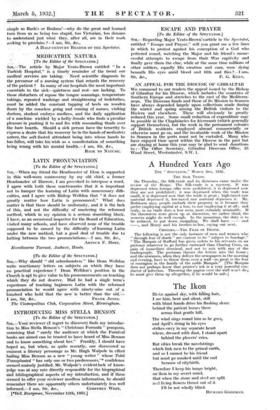A Hundred Years Ago
THE " SPECTATOR," MARCH 3RD, 1832.
THE SILK TRADE.
On Thursday, the Silk-trade and its distresses came under the review of the House. The Silk-trade is a mystery. It was depressed when foreign silks were prohibited, it is depressed now they are not prohibited ; it was depressed when the trade was small, it is depressed now that the trade is great ; high-taxed raw material depressed it, low-taxed raw material depresses it. Mr. Robinson says, people embark their property in it because they prefer employing capital at a loss, to not employing it at all ; and truly, in no trade does a loss seem more certainly attainable, If the throwsters were given up at discretion, we rather think the weavers might do well enough. In the meantime, the duty is to be reduced, to put down smuggling. Wo shall have — and —, and Henry and his brother-in-law, crying out next.
CHOLERA—TEE FEAR OF DEATH.
The following is not the only instance of men and women who "through fear of death" are content to be " subject to bondage." "The Marquis of Stafford has given orders to his servants on no pretence whatever to go further eastward than Charing Cross, on pain of immediate dismissal, and not to mix with any of the tradespeople. The postman throws the letters into the house ; and the newsmen, when they deliver -the newspapers in the morziihg and evening, have to throw them over a wall—so great is the fear of contagion in the family of the noble Marquis.' , [The Marquis does not perhaps know that printer's ink is a very powerful con- ductor of infection. Throwing the papers over the wall won't do ; he must give them up altogether, if he would be safe.]


















































 Previous page
Previous page